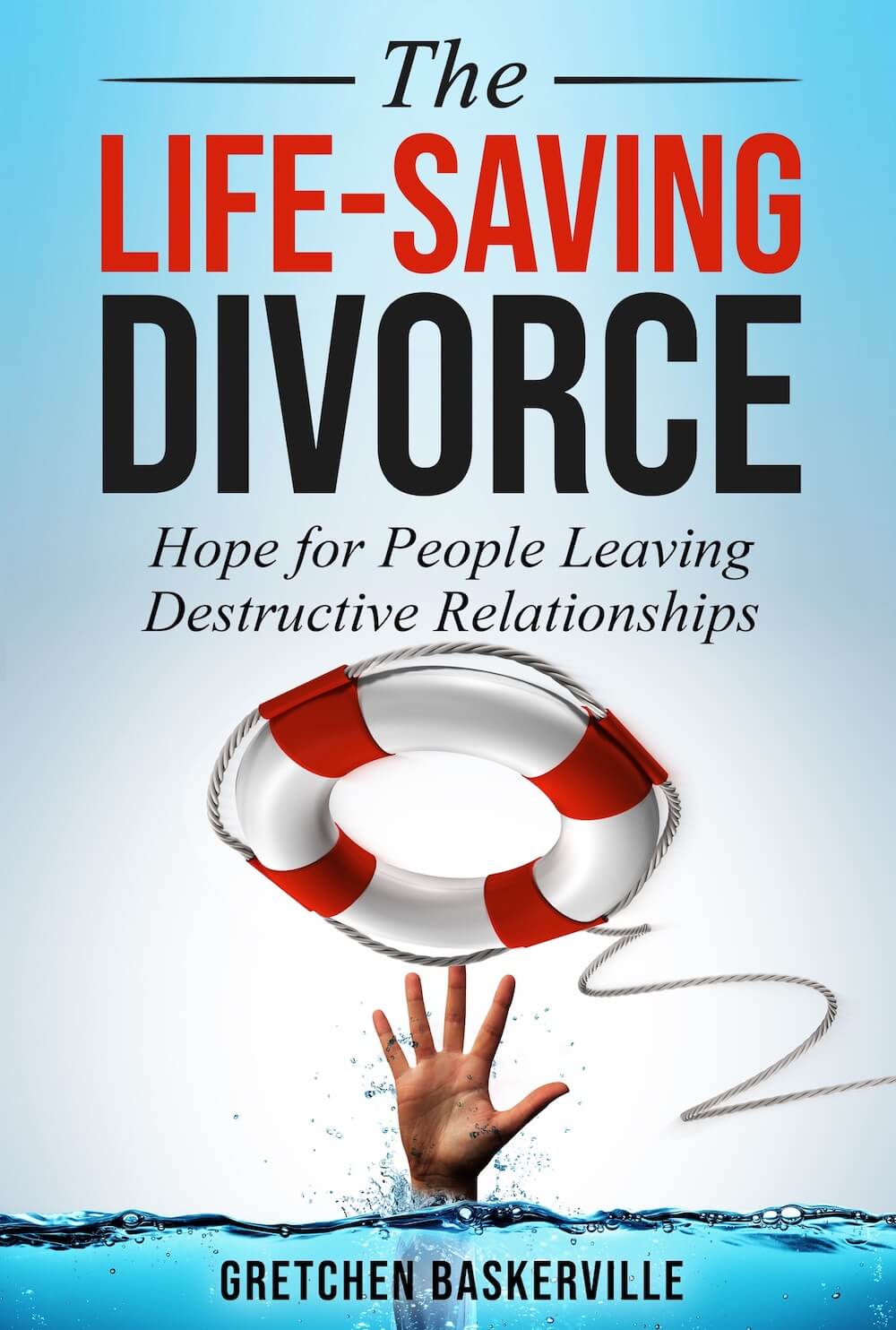Pastors, Christian marriage authors, and Christian radio programs like to quote the study by Dr. Linda Waite and journalist Maggie Gallagher, who found, “Two out of three unhappily married adults who avoided divorce or separation ended up happily married five years later.”
When this study came out in 2002, pastors and Christian radio programs went wild, trumpeting this from the pulpit and airwaves. They often proposed that an unhappy couple merely had to stay together a few more years and their marriage would become happy. They also suggested that those who didn’t take their advice, and chose to divorce, were quitters who wanted the easy way out.
- -Your unhappy marriage will become happy if you stay 5 years
- -Divorce will make you unhappy.
- -Divorcees are selfish people who give up too early and take the easy way out
But people who claimed this did not read the Waite and Gallagher report. (Or if they did, they ignored her real conclusions.) More than seven times, Waite says the opposite, often showing that destructive marriages aren’t likely to become happy, and that divorce in those cases often results in increased happiness.
Staying 5 years is unlikely to help where there is serious marriage-endangering sin, such as a pattern of sexual immorality, physical abuse, emotional abuse, life-altering addictions, abandonment or neglect.
Marriage-at-any-cost organizations, such as Focus on the Family, love to quote the Waite 2002 study and her 2003 book. Their articles suggest that marriages will universally improve over time, and that those who divorce are always unhappy.
But that’s wrong! The Waite study actually found something quite different: She found that people in destructive marriages are better off by divorcing, and that 81% of those individuals who remarried during the study were happier in the next marriage! The main quote you’ll hear from Dr. Linda Waite’s study is this: “Almost two-thirds of unhappy spouses who stuck with the marriage forged happy marriages down the road” (emphasis mine). And this quote: “Two out of three unhappily married adults who avoided divorce or separation ended up happily married five years later.” But that means that one-in-three did not ever become happy.
In the last sentence of the Waite study (2002), Dr. Waite says that divorce or separation are likely the best outcome for a destructive marriage: —
“Both people and marriages are likely to be happier in communities with a strong commitment to marital permanence. While some marriages are so destructive that divorce or separation is the best outcome, marriages are more likely to be both happy and stable when marriage is highly valued – a key relation in whose success family, friends, faith communities, counselors, family-law attorneys, and the wider society have an important stake.” – Linda J. Waite, Don Browning, William J. Doherty, Maggie Gallagher, Ye Luo, and Scott M. Stanley, Does Divorce Make People Happy, Institute for Family Values, 2002, p. 33.
—
“Among those unhappily married spouses who stayed married, what factors predicted happier marriages down the road? Marriages with high conflict and domestic violence were less likely to become happy five years later.” p. 11-12
She’s saying that you can tell in advance which unhappy marriages are likely to become happy, and it’s not the destructive ones. The ones with high conflict and domestic violence aren’t as likely to become happy.
—
“If the problem is marital violence, divorce appears to offer significant relief.” p. 12
So, we can say people who escaped unhappy violent marriages are often happier. They are greatly relieved to get to safety.
—
“When an unhappily married adult experiences violence, divorce and remarriage significantly reduce the likelihood he or she will experience domestic violence (at least from spouses).” p. 12
Here Waite says that divorce and remarriage reduces the likelihood of domestic violence.
—
“…24 percent of those unhappy spouses who divorced or separated ended up in a second marriage within five years. Eighty-one percent of those second marriages were happy.” p. 12
She’s saying the vast majority of unhappily married spouses who divorced and remarried found better partners the second time: 81%!
—
“Does divorce make unhappily married people happy? The answer, surprisingly, in this research, seems to be no….With the important exception of reducing the incidence of marital violence for unhappy spouses (in violent marriages), divorce failed, on average, to result in improvements in psychological well-being for unhappy spouses.” p. 13-14
She’s saying, in general, divorce does not make people happy. But if a person is in a violent home, divorce will likely will reduce the violence and increase their happiness.
—
Quote 7: Waite What kinds of marriages improved? The marriages that improved were those with “outside stressors,” not bad behavior by one spouse.
“Many spouses we interviewed who survived marital unhappiness did not see problems within the relationship as the cause. Instead they blamed outside forces for causing both unhappiness and relationship stress: Spouses became ill, lost jobs, got depressed, children got into trouble or created marital stresses by their financial and emotional demands.” p. 15
Waite is saying that when the problems were illness, lost jobs, financial stress, and kids with behavior problems, those marriages were the types that improved. But when the cause of marital unhappiness was something in the character and behavior of one spouse (for example, drunkenness, infidelity, violence), it did not improve.
Waite lists one story of a serious relationship problem that improved: a husband who stopped drinking after two years. (Two years? This is somewhat humorous. All wives of drug and alcohol addicts wish they could be so fortunate!)
—
Quote 8: Waite This quote is from Waite’s book A Case for Marriage. Waite agrees with researchers Paul Amato and Alan Booth who concluded that although divorce is usually negative for children, it is beneficial for children in 3 in 10 cases:
“What proportion of divorces are preceded by a long period of overt interparental conflict, and hence, are beneficial to children?” asked Amato and Booth. “From our own data we estimate that less than a third of parental divorces involve highly conflicted marriages.” Just 30 percent of divorcing spouses reported more than two serious quarrels in the past month, and less than a quarter said they disagreed “often” or “very often” with their spouses. This bears repeating: Less than a third of divorces are ending angry high-conflict marriages. -Waite, Linda J.; Maggie Gallagher. The Case for Marriage (p. 147). Crown. Kindle Edition.
Quote 9: Hawkins and Booth Another study was done three years later by another team of researchers using the SAME data. They didn’t just look at five years, they looked at unhappy marriages that had gone on for at least twelve years. They used the same national survey Dr. Waite did, but they did a more thorough job and they measured more than just “happiness,” they measured three more factors, including the person’s overall health. They found that-
“Remaining unhappily married is associated with significantly lower levels of overall happiness, life satisfaction, self-esteem and overall health along with elevated levels of psychological distress compared to remaining otherwise continuously married. There is also some evidence that staying unhappily married is more detrimental than divorcing, as people in low-quality marriages are less happy than individuals who divorce and remarry. They also have lower levels of life satisfaction, self-esteem and overall health than individuals who divorce and remain unmarried. Unhappily married people may have greater odds of improving their well-being by dissolving their low-quality unions as there is no evidence that they are better off in any aspect of overall well-being than those who divorce.” -Daniel N. Hawkins and Alan Booth, Unhappily Ever after: Effects of Long-Term, Low-Quality Marriages on Well-Being, Social Forces, Vol. 84, No. 1 (Sep., 2005), pp. 451-471, from the abstract
Stories of improved health after a life-saving divorce are common, as leading researcher Dr. Mavis Hetherington notes:
“The one striking exception to the otherwise general rule about postdivorce decline in health were women who had been in distant or hostile marriages.” -Hetherington, Kelly, For Better or For Worse (2002), p. 59
Are you going through a life-saving divorce? I’d like to invite you to my private Facebook group, “Life-Saving Divorce for Separated or Divorced Christians.” Just click the link and ANSWER the 3 QUESTIONS. This is a group for women and men of faith who have walked this path, or are considering it. Also, sign up for my email list below.
- What is a Life-Saving Divorce? How Do We Know Half of Divorces are “Life-Saving”? (or watch the video)
- Life-Saving Divorce: Introduction What Is this Book About? (audio and transcript)
- About Me: Why Is a Nice Christian Girl Like Me Promoting Divorce?
- How Can I Get the Book, The Life-Saving Divorce? (Amazon affiliate link.)
- 130 Examples of Abuse: Emotional, Physical, Financial, Spiritual and Gaslighting
- Abuse is Biblical Grounds for Divorce
- “But He Never Hit Me”: Divorce for Neglect, Emotional, and Financial Abuseå
- Pastors Who Accept Physical and Emotional Abuse as Grounds for Divorce
- Severe Emotional Neglect: Toni’s Story of Finding Freedom (video)
- 40 Years of Murderous Rages and How I Got Free! Karen’s story (video)
- How Churches Should Handle Abuse Victims (video with Pastor Neil Schori)
- Help! I’m Married to a Cheater: Should I Stay or Go?
- Married to a Pedophile: How I Got Out – Pam’s Story (video)
- Help! I Am Alone with the Abuser
- Jesus’ Greatest Divorce Sermon – Luke 13 (or watch the Video)
- Pastors Who Accept Physical and Emotional Abuse as Grounds for Divorce
- Myth: The Person Who Files for Divorce Caused the Divorce
- Haven’t Our English Bibles Always Said, “God hates divorce”? No.
- Jesus Said, “Love My Enemy”-Can I Still Divorce Them?
- But I Thought it Was God’s Will for Me to Marry this Person!
- Is Pointing Out Marriage-Endangering Sin Being Judgmental? (video)
- One Woman’s Story: Adultery, Prayer and the Bible
- Is Marriage an Unconditional Covenant or a Conditional One? (Video)
- Does Divorce Shatter the Image of Christ and the Church as John Piper Suggests?
- Divorce and the Good Samaritan Story
- Myth: Divorce is the Unpardonable Sin and “God Hates Divorce”
- Myth: Your Divorce Will Shatter the Image of Christ and the Church
- Myth: You Must Forgive and Forget Over and Over, Forever
- Malachi 2:16 Haven’t Our English Bibles Always Said, “God hates divorce”? No.
- Myth: Divorce is the Unpardonable Sin and “God Hates Divorce”
- List of Every Known Puritan Divorce in Massachusetts between 1639 and 1692.
How to Find a Good Supportive Church
- Pastors Who Accept Physical and Emotional Abuse as Grounds for Divorce
- 7 Ways to Know if a Church is Safe for Abused Wives (or Abused Husbands)
- Do My Pastors Have a Say about Me Getting a Divorce?
- Good vs. Bad Pastoral Counselors on the Topic of Marital Abuse: 40 People Tell their Stories
- 5 Bible Verses that Say You Should Separate from an Abuser
- 1 Million God-honoring Divorcees Cannot Find a Good Church
- Church Denominations and Divorce Policies Comparison Chart
- Excommunication for Getting Divorced? What to Do!
- Evangelicals Shooting their Own Wounded Divorcees (video) or blog/transcript
- How to Handle Criticism When You Divorce (video-3 parts) Natalie Hoffman, Gina Kaye
- Myth: You Don’t Take God-Ordained Marriage Seriously
- Sermon Ideas for Domestic Violence Awareness Month – October
- Churches That Block Abused Wives (and Husbands) From Divorcing
- Southern Baptists make Evangelicalism Unsafe for Abused Wives & Husbands
- How Churches Should Handle Abuse Victims (video with Pastor Neil Schori)
- Your Kids Will Likely Be Fine After Divorce (Nearly 8 in 10 Are!)
- 10 Facts Evangelical Pastors MUST Know about Kids and Divorce [VIDEO]
- There Is No Divorce Crisis. We have a Sin Crisis.
- Myth: 95% of Divorces are for Falling Out of Love
- Will I Ever Find Love Again?
- Dating after Divorce: An interview with Gina Kaye
- I Fear I’ll Never Find a Healthy Relationship
- Remarriage after Divorce: How Can I Claim to be the Innocent Spouse? I Had My Faults Too!
- Will the Kids and I Ever Be Happy Again?
- Happiness Either Way: Remarriage or Staying Single
- Divorce May Improve Your Health: Depression, Suicidal Thoughts and Medical Issues
- How My Health Improved Dramatically After Divorce: Karen’s Story (video)
- “I’m Off of All My Depression Medications Now That I’ve Divorced” Schari’s story (video)
- PTSD, EMDR and My Major Health Improvements after Divorce Toni’s story (video)
- Christians Finding Peace after Divorce: Shirley Fessel, Author (Audio) or (Video)
- 10 Turning Points: Stories of How Others Decided to Stay or to Go
- Married to a Pedophile: How My Kids and I Got Free! (video)
- Finding Joy after a 40-Year Abusive Marriage (video)
- Can I Divorce My Mentally Ill, Destructive Spouse? Yes! Amanda’s Story (video)
- From Bondage to Glorifying God! 5 Survivor Stories (after 20-, 30-, 40-year long abusive marriages)
Self-Doubt, Second-Guessing Ourselves, and Gaslighting
- Am I the One Destroying the Relationship?
- How Can I Call Myself the Innocent Spouse? I Wasn’t Perfect Either (video)
- Is Pointing Out Marriage-Endangering Sin Being Judgmental? (video)
- Myth: He Wouldn’t Cheat or Watch Porn if You Gave Him More Sex
- Myth: You’re Lying: We’d All Know If Your Spouse Was That Bad
- Myth: It Takes “Two to Tango” and “All Marriage Problems are 50/50”
- How to Handle Criticism When You Divorce (video-3 parts) Natalie Hoffman, Gina Kaye
- Is it Best to “Stay for the Kids”? Sometimes, yes. But Not if It’s a Toxic Marriage
- Researchers Know Your Kids Will Likely Be Fine After Life-Saving Divorce
- 5 Studies That Say Your Kids are Likely to Be Okay After Divorce (video)
- Marriage Does Not Guarantee Good Kids: 1 in 10 Kids from Married Two-Parent Homes are Troubled.
- Myth 21: Divorce will Destroy Your Children, So Stay for the Sake of Your Kids
- Research shows: Your Kids Will Likely Be Fine After Divorce: In Fact It’s Best to Divorce to Get Away From Abuse
- 12 Ways to Document and Protect Yourself in a High-Conflict Divorce
- 12 Tips for Talking with Angry, Alienated Kids
- Myth: Divorce will Destroy Your Children, So Stay for the Sake of Your Kids
- Myth: Your Marriage Would Be Great if You Just Submitted More
- Myth: Divorce will Destroy Your Children, So Stay for the Sake of Your Kids
- Myth: Divorce is the Unpardonable Sin and “God Hates Divorce”
- Myth: You Just Didn’t Try Hard Enough
- Myth: You Don’t Take God-Ordained Marriage Seriously
- Myth: Your Divorce Will Shatter the Image of Christ and the Church
- Myth: You Must Forgive and Forget Over and Over, Forever
- Myth: 95% of Divorces are for Falling Out of Love
- 27 Myths about Divorce That Probably Don’t Apply to Committed Christians
- Download “7 Effective Ways to End the Stigma of Divorce in the Church” (Sign up)
- Download “7 Effective Ways to Deal with Criticism when You Divorce” (Sign up)
- Download “3 Studies that Show Kids Are Most Likely to Turn Out Fine After Divorce” (Sign up at bottom of page)
- Home Follow me on Facebook • Follow me on Twitter • Buy the book.
- 10 Key Highlights from the The Life-Saving Divorcebook: 10-minute video overview OR 10 Key highlights blog post
- Request to Join the Life-Saving Divorce Private Facebook Group (Don’t forget to answer the 3 questions)
- Subscribe (FREE) to my You Tube Channel
- About Me Contact
- Gretchen’s Life-Saving Divorce Interviews in the Media



 :
:
 Buy PDF
Buy PDF